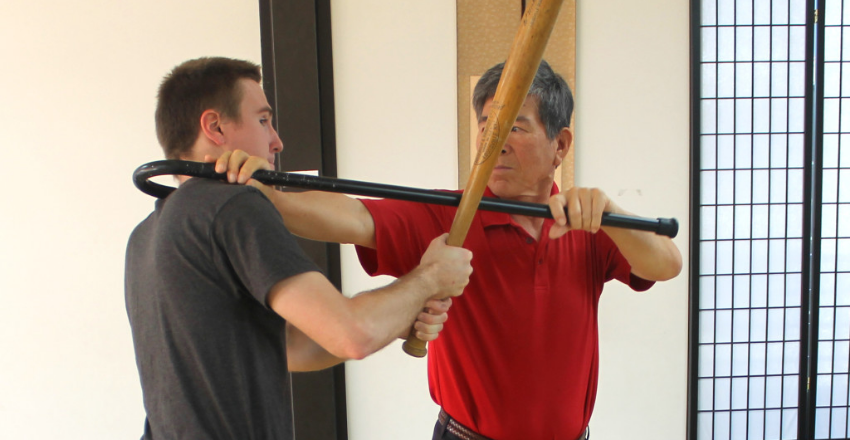Use Your Walking Cane for Home-Defense
By Master H Keith Melton, President of Cane Masters LLC

An 81-year-old resident of Niles, Illinois, found a new use for his antique walking cane earlier this month. Dan and Barbara Donovan answered the front doorbell to find a man wearing a reflective vest and carrying tools and asking to be allowed inside to check their "fuse box." The request sounded plausible as the homeowners received a letter from their electric company the day before informing them that workers would be in their area because of power outages.
The obliging homeowners led the "worker" to the fuse box in their basement. Immediately doubts arose about the stranger's intentions as he ignored the fuse box repeatedly asked the couple to step closer to him. As they refused, they heard a creaking of the floorboards overhead and realized that someone was inside their bedroom. Dan and his wife rushed upstairs and discovered that their front door had been left open, and two men were ransacking their home.
Dan Donovan grabbed the closest and "most persuasive tool," a vintage walking stick that once belonged to his grandfather and began his defense. It turned out to be the equalizer that he needed. As one of the burglars passed by from the bedroom carrying a pillowcase filled with valuables, Dan struck him in the back of the head, but without enough force to make him drop the pillowcase. As the three burglars fled to their SUV parked in the driveway, Dan followed. He didn't retrieve his valuables but successfully cracked both their rear window and front windshield. In his haste, however, neither Dan nor his wife thought to note the burglar's license plate number, and the culprits were not apprehended.
While we commend Dan for his home defense, his later actions were, at best, well-intentioned and foolish at worst. He had every right to defend himself and his wife inside their home, but as the criminals fled, he had no legal right to pursue them to recover stolen property. Had he successfully struck one of them in the head outside the home, he could have left himself open to criminal charges for assault and even a civil suit later for damages from the culprit, or his family (if deceased). Even worse, however, one of the villains may have been armed and started shooting.
These types of scams are known as "ruse entries" where criminals impersonate workers from gas, cable, electric, or tree companies; they may also pose as employees from the local "Water Department" with the intent to gain access and burglarize your home. While the resident of the house is distracted, an accomplice enters the home to steal valuables. The local police department issued the following suggestions to concerned residents:
- If you don't know who is at the door and aren't expecting anyone, don't open it. Look through your window or peephole before opening the door.
- Ask for identification. Check the identity of the visitor by calling the
company to confirm their employment. Obtain the telephone number independently and do not use any telephone numbers provided by the visitor as they may be part of the scam.
- Do not open or unlock the door while attempting to verify the identity of the visitor. If possible, take a photo of the person and their vehicle from inside your home.
- Do not agree to go to your backyard or side of the house with this person. If you must, make sure to get your keys and lock your front door behind you first.
- Keep doors and windows secure at all times.
- Safeguard your valuables and documents with your personal information.
Cane Masters LLC would like to add the following tips for additional home safety:
- Keep a solid wooden cane in the corner adjacent to all of your primary entrances and exits. For most homeowners, that is their garage door, front door, and rear door. As opposed to firearms, you don't have to be worried about keeping an extra cane (or several canes) positioned around your residence for safety.
- Take the time to learn to use your cane properly for personal protection. You'll gain confidence, agility, stamina and burn lots of calories by exercising with your cane daily. Daily training sessions don't have to be seen as drudgery once you get the hang of it.
- I prefer positioning "Bantam" walking canes strategically around my home in places they will be readily available should the need arise. Bantam canes are typically four inches shorter than standard 36" canes and more convenient for maneuvering in tight spaces such as hallways, doorways, and maneuvering around furniture. Wielding a shorter and lighter cane will provide greater maneuverability in close quarters and decrease the chance of getting "hung-up" on a wall or other object and allowing an intruder to disarm you. Shortening a standard walking cane by four inches reduces the weight by a few inches and makes it faster and more maneuverable for defensive movements. A smaller cane is also more conducive to close-quarters techniques such as cane-boxing. Because my fingers still comfortably reach the top of the cane, however, it qualifies as an ambulatory tool and may be carried with you anywhere, including on your next flight.
- At Cane Masters, many of our clients are so proud of our custom walking canes that they often display them on stands in their homes and offices as objets d'art to enhance their décor. Our canes' beautiful finishes and craftsmanship provide additional reasons to display them while prepositioning them at various entry points.
- The time to have your cane in hand is BEFORE you open the door to a stranger. Even if you are following the police tips above, criminals are infinitely creative, and who among us doesn't trust the friendly smile of a man (or woman) dressed to resemble a driver for UPS, Federal Express, Amazon, etc.
- Opening the door to a stranger with a cane in your hand doesn't appear overly aggressive and is seen as "being more friendly" than holding a shotgun. However, both tools can be intimidating to a criminal, and with training, both can prove useful in protecting you and your loved ones.
- If you live in the countryside or don't have neighbors close by, some determined criminals will drop the ruse as soon as they see it isn't working and revert to a home invasion. As such, retreat immediately to one of your inner rooms and barricade the door.
- Some couples (and families) determine a safe word or phrase in advance to signal that the other should retreat to a designated and prepared place of safety within the home to call for help. A criminal may find it strange that you tell your wife to "water the cactus" without understanding that you are employing a code-word.
- Hopefully, you prepared for a home invasion scenario in advance and prepositioned additional weapons and personal protection tools (yes, another cane or two) "just in case." Remain safely inside a protected area, or safe room, until the police arrive. Yes, the bad guys may steal something on their way out the door, but if you and your family are safe, the trade-off is worth it. Physical items are replaceable. Your life and those of your family aren't.
- With training, a cane can be a "less lethal" but highly effective tool for personal protection. And, you'll never have to worry about a bullet penetrating the walls of your home and endangering family members or even neighbors.
- Using a cane defensively combines well with other forms of home-defense, including impact and projectile weapons. Very importantly, a cane provides you with the opportunity for controlled escalation vs. relying solely on more lethal tools that are accompanied by legal implications.
- Canes potentially require less training than firearms and can be practiced at home rather than a firing range. They are usually faster to deploy and easier to use for the elderly and other individuals with limited dexterity, decreased response times, reduced vision, and poor hand-eye coordination. Regular cane training can improve some of these attributes. The right combination of weaponry for home defense is a personal decision and requires a self-assessment of your physical, mental, and emotional tools. A cane can be an invaluable part of an individual's overall home defense strategy.
- Should you ever be in a situation that requires you to use force to repel a criminal, remember to contact the authorities as soon as you secure your residence or reach a place of safety. Provide a full description of the attackers to the police and, where possible, their license plate number. While you will want to cooperate with the authorities to apprehend the culprits, there will be time later to provide a detailed account of the events in your home. Initially, it is sufficient to inform the authorities that you were in fear for your life and acted in self-defense. If you believe that you need medical attention, you should notify the police immediately. Only provide a full statement to authorities after you have been checked over at the hospital and had time to consult with your attorney.
